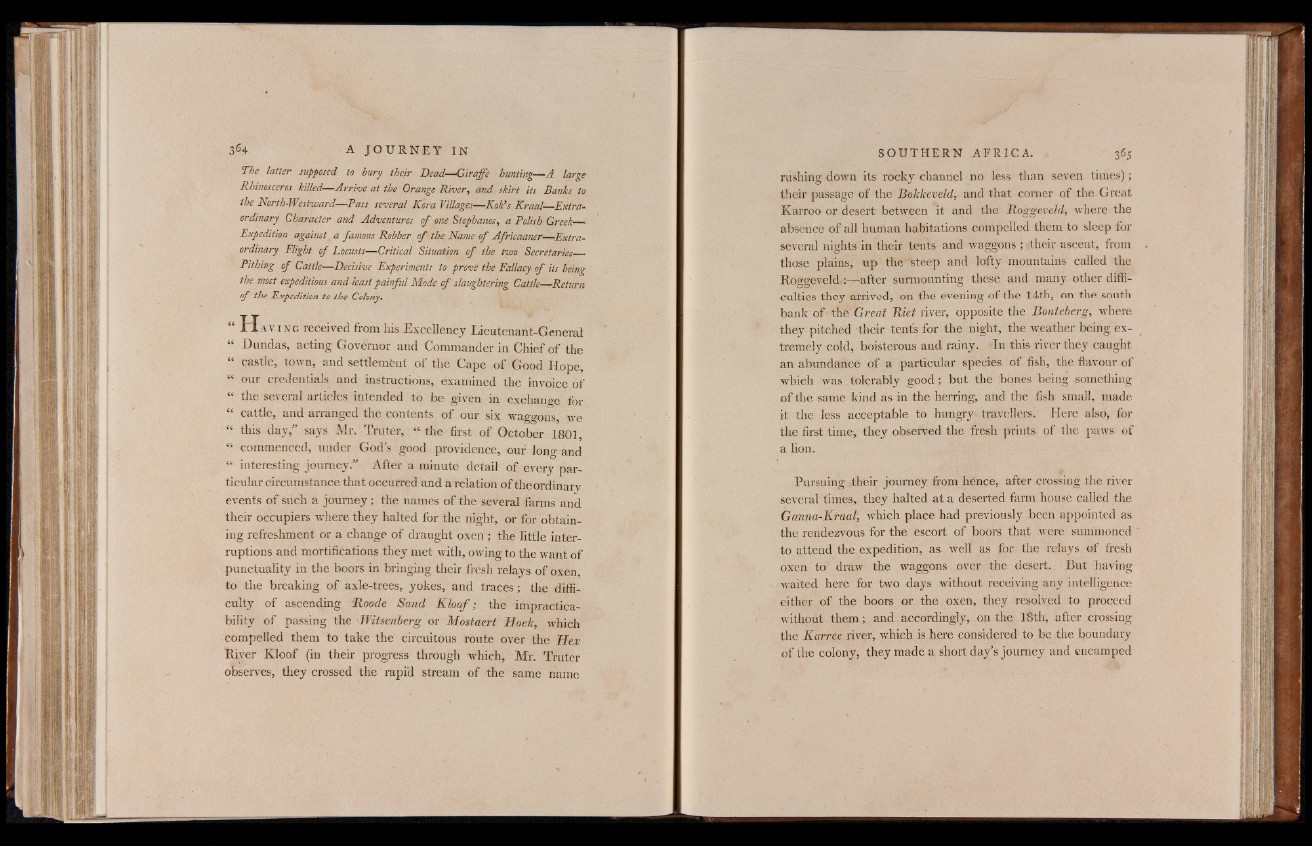
The latter supposed to bury their Dead—Giraffe hunting— A large
Rhinosceros killed— Arrive at the Orange River, and skirt its Banks to
the North-Westward— Pass several Kora Villages— Kok’s Kraal— Extraordinary
Character and Adventures of one Stephanos, a Polish Greek—
Expedition against a famous Robber of the Name of Africaaner— Extraordinary
Flight of Locusts— Critical Situation of the two Secretaries—
Pithing of Cattle— Decisive Experiments to prove the Fallacy of its being
the most expeditious and least painful Mode of slaughtering Cattle— Return
of the Expedition to the Colony.
“ H a v i n g received from his Excellency Lieutenant-General
“ Dundas, acting Governor and Commander in Chief of the
“ castle, town, and settlement of the Cape of Good Hope,
“ our credentials and instructions, examined the invoice of
“ the several articles intended to be given in exchange for
" cattle, and arranged the contents of our six waggons, we
“ this day," says Mr. Truter, “ the first of October 1801,
“ commenced, under God’s good providence, our long and
“ interesting journey.” After a minute detail of every particular
circumstance that occurred and a relation of the ordinary
events of such a journey; the names of the several farms and
their occupiers where they halted for the night, or for obtaining
refreshment or a change of draught oxen; the little interruptions
and mortifications they met with, owing to the want of
punctuality in the boors in bringing their fresh relays of oxen,
to the breaking of axle-trees, yokes, and traces; the difficulty
of ascending :Roode Sand Kloof; the impracticability
of passing the Witsenberg or Mostaert Hoek, which
compelled them to take the circuitous route over the Hex
Liver Kloof (in their progress through which, Mr. Truter
observes, they crossed the rapid stream of the same name
rushing down its rocky channel no less than seven times);
their passage of the Bokkeveld, and that corner of the Great
Karroo or desert between it and the Roggeveld, where the
absence of all human habitations compelled them to sleep for
several nights in their tents and waggons ; »their ascent, from
those plains, up the 'steep and lofty mountains called the
Roggeveld,:—after surmounting these and many other difficulties
they arrived, on the evening of the 14th, on the south
bank of the Great Riet river, opposite the Bonteberg, where
they pitched their tent's for the night, the weather being extremely
cold, boisterous and rainy. ‘In this river they caught
an abundance of a particular species of fish, the flavour of
which was tolerably good; but the bones being something
of the same kind as in the herring, and the fish small, made
it. the less acceptable to hungry travellers. Here also, for
the first time, they observed the fresh prints of the paws of
a lion.
Pursuing their journey from hence, after crossing the river
several times, they halted at a deserted farm house called the
Ganna-Kraal, which place had previously been appointed as
the rendezvous for the escort of boors that were summoned
to attend the expedition, as well as for the relays of fresh
oxen to draw the waggons over the desert. But having
waited here for two days without receiving any intelligence
either of the boors or the oxen, they resolved to proceed
without them; and accordingly, on the 18th, after crossing
the Karree river, which is here considered to be the boundary
of the colony, they made a short day’s journey and encamped